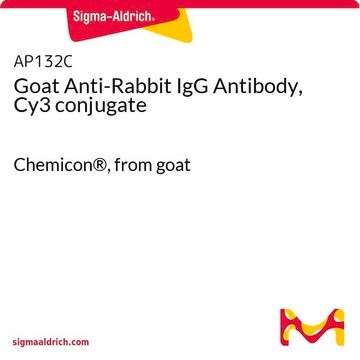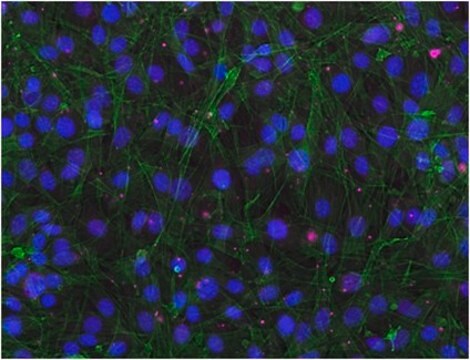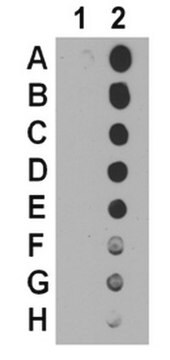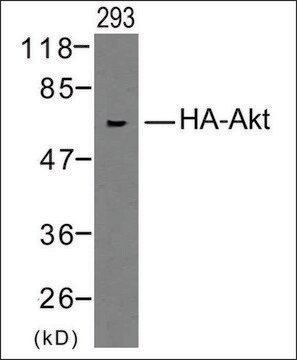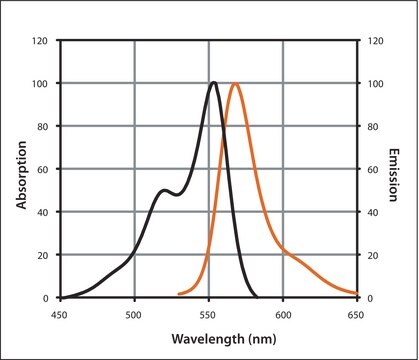おすすめの製品
由来生物
goat
品質水準
結合体
CY3 conjugate
抗体製品の状態
F(ab′)2 fragment of affinity isolated antibody
抗体製品タイプ
secondary antibodies
クローン
polyclonal
交差性
rabbit
メーカー/製品名
Chemicon®
濃度
1.5 mg/mL
テクニック
immunofluorescence: suitable
輸送温度
wet ice
ターゲットの翻訳後修飾
unmodified
関連するカテゴリー
特異性
Rabbit IgG (H+L) (absorbed for minimal cross-reactivity to Human, Mouse and Rat Serum Proteins)
FLUOROPHORE/ PROTEIN ABSORBANCE RATIO
Approximately 2.25-2.8(A552/A280) = 2.7
FLUOROPHORE/ PROTEIN ABSORBANCE RATIO
Approximately 2.25-2.8(A552/A280) = 2.7
アプリケーション
Research Category
二次抗体及びコントロール抗体
二次抗体及びコントロール抗体
Research Sub Category
二重標識用 吸収処理済み二次抗体
二重標識用 吸収処理済み二次抗体
Suggested dilution for most applications: 1:100-1:800 for most applications.
Optimal working dilutions must be determined by the end user.
Optimal working dilutions must be determined by the end user.
This Goat anti-Rabbit IgG Antibody, Cy3 conjugate, Species Adsorbed is validated for use in IF for the detection of Rabbit IgG.
物理的形状
Lyophilized. Buffer = 0.01 M Sodium Phosphate, 0.25 M NaCl, pH 7.6 with 15 mg/mL BSA, and 0.05 Sodium Azide.
RECONSTITUTION:
Reconstitute to 1.5 mg/mL with sterile distilled water.
RECONSTITUTION:
Reconstitute to 1.5 mg/mL with sterile distilled water.
保管および安定性
Maintain lyophilized product at 2-8°C for up to 12 months. After reconstitution the product is stable for several weeks at 2-8°C as an undiluted liquid. For extended storage after reconstitution, add an equal volume of glycerol to make a final concentration of 50% glycerol followed by storage at -20°C in undiluted aliquots for up to 12 months. Please note the concentration of protein (and buffer salts) will decrease to one-half of the original after the addition of glycerol. Avoid repeated freeze/thaw cycles.
法的情報
CHEMICON is a registered trademark of Merck KGaA, Darmstadt, Germany
免責事項
Unless otherwise stated in our catalog or other company documentation accompanying the product(s), our products are intended for research use only and are not to be used for any other purpose, which includes but is not limited to, unauthorized commercial uses, in vitro diagnostic uses, ex vivo or in vivo therapeutic uses or any type of consumption or application to humans or animals.
適切な製品が見つかりませんか。
製品選択ツール.をお試しください
適用法令
試験研究用途を考慮した関連法令を主に挙げております。化学物質以外については、一部の情報のみ提供しています。 製品を安全かつ合法的に使用することは、使用者の義務です。最新情報により修正される場合があります。WEBの反映には時間を要することがあるため、適宜SDSをご参照ください。
毒物及び劇物取締法
毒物
Jan Code
AP187C:
試験成績書(COA)
製品のロット番号・バッチ番号を入力して、試験成績書(COA) を検索できます。ロット番号・バッチ番号は、製品ラベルに「Lot」または「Batch」に続いて記載されています。
Estrogen and androgen receptor expression in surface epithelium and inclusion cyst in the ovary of premenopausal and postmenopausal women.
Mendez, C; Morales-Vasquez, F; Perez-Montiel, D; Gomora, MJ; Espinola-Zetina et al.
Journal of Ovarian Research null
Xufeng Dai et al.
Investigative ophthalmology & visual science, 55(3), 1724-1734 (2014-02-22)
The retinal degeneration 11 (rd11) mouse is a newly discovered, naturally occurring animal model with early photoreceptor dysfunction and rapid rod photoreceptor degeneration followed by cone degeneration. The rd11 mice carry a spontaneous mutation in the lysophosphatidylcholine acyltransferase 1 (Lpcat1)
Hua Zhang et al.
Journal of ophthalmology, 2017, 9721362-9721362 (2017-02-09)
The retinal degeneration 11 (rd11) mouse is a new animal model with rapid photoreceptor degeneration. The long-term efficacy of gene therapy has a direct relationship with the onset of photoreceptor degeneration or apoptosis, whereas the degeneration or apoptosis patterns of
Hee Yeon Kay et al.
The Journal of clinical investigation, 125(10), 3904-3914 (2015-09-09)
Valproic acid (VPA) has been widely used for decades to treat epilepsy; however, its mechanism of action remains poorly understood. Here, we report that the anticonvulsant effects of nonacute VPA treatment involve preservation of the M-current, a low-threshold noninactivating potassium
Xiaohong Yao et al.
PloS one, 8(3), e57188-e57188 (2013-03-29)
Human glioblastomas (GBM) are thought to be initiated by glioma stem-like cells (GSLCs). GSLCs also participate in tumor neovascularization by transdifferentiating into vascular endothelial cells. Here, we report a critical role of GSLCs in the formation of vasculogenic mimicry (VM)
ライフサイエンス、有機合成、材料科学、クロマトグラフィー、分析など、あらゆる分野の研究に経験のあるメンバーがおります。.
製品に関するお問い合わせはこちら(テクニカルサービス)